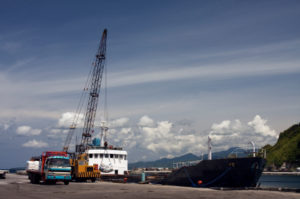 The Maritime Industry Authority (MARINA) is conducting a survey on the fuel consumption of domestic ships to prepare for the phased implementation of the International Maritime Organization’s (IMO) global 0.50% sulfur cap on marine fuel oil.
The Maritime Industry Authority (MARINA) is conducting a survey on the fuel consumption of domestic ships to prepare for the phased implementation of the International Maritime Organization’s (IMO) global 0.50% sulfur cap on marine fuel oil.
MARINA Shipyards Regulation Service director Ramon Hernandez, in a media briefing on December 18, said the survey will enable the Department of Energy (DOE) to know how much supply of low sulfur fuel oil (LSFO) domestic shipping lines will need once the country implements the IMO regulation by the target date of 2025.
Annex VI of the International Convention for the Prevention of Pollution from Ships, or MARPOL Convention, requires all ships in non-emission control area zones to limit the sulfur content of their fuels from 3.50% to 0.50% by January 1, 2020. The Philippines ratified MARPOL Annex VI in 2018.
The regulation applies to all ships, whether they are on international voyages between two or more countries, or on domestic voyages solely within the waters of a party to the MARPOL Annex.
The sulfur cap policy, also known as IMO 2020, aims to reduce the amount of sulfur oxides emanating from ships in order to gain health and environmental benefits for the world, particularly for populations living close to ports and coasts.
While global implementation of IMO 2020 is set for January 1, 2020, a phased implementation is being pushed in the Philippines, as several factors would affect compliance, such as availability of compliant fuel and readiness of ships.
Hernandez earlier noted that compliant fuel is not yet available in the country, and that refineries would need two to three years to construct the storage facilities for such fuel. Domestic shipping lines have also raised concerns about the cost implications of the new policy, as LSFO is more expensive than the bunker fuel they currently use.
During the media briefing, Hernandez noted that according to IMO, “it’s up [to] the flag state” on how it would implement the policy.
MARINA is currently spearheading the drafting of a roadmap on the phased implementation of IMO 2020 for domestic ships by 2025.
Once the survey is done and the roadmap finalized by 2020, Hernandez said a memorandum circular on the IMO 2020 implementation for domestic ships will be issued.
But while the roadmap is still being finalized, MARINA is already encouraging domestic ship owners and operators to craft their transition plans for complying with IMO 2020.
“All domestic ship owners and operators are encouraged to start seeking more environmentally friendly sources of fuel or technologies that will lessen their ships’ hazardous emissions,” MARINA said in a separate statement.
While domestic implementation will not happen until five years from now, MARINA said it will enforce IMO 2020 on foreign-flag vessels calling Philippine ports, as well as Philippine-flag vessels operating overseas.
MARINA is urging all Philippine-registered ships operating overseas to be compliant with IMO 2020 by January 2020.
Hernandez said that based on the discussion with DOE and fuel manufacturers, a supplier will be bringing in compliant fuel, to be used by Philippine-flag vessels trading overseas.
For foreign-flag vessels calling Philippine ports, the Philippine Coast Guard, as the port state control implementer, will monitor compliance with IMO 2020. – Roumina Pablo
